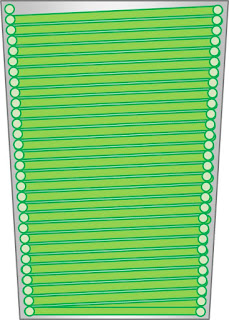Enter: the 30-gallon trash can. With a base diameter of 18", a top diameter of a 20.625", and a height of 27", they can hold an awful lot of hose coiled up inside (even without the help of sorcerers). How much? Time for some math!
 |
| We need some dimensions to get a ballpark figure. In the United States, most hoses are 5/8 inch (0.625") in diameter, meaning that if they were stacked perfectly, 43 coils would fit in 27". If the diameter of the can increases from 18" to 20.625" over those 27", each coil gets an extra 0.061" in diameter. The circumference (which is the length of hose that fits in one coil) therefore increases from 4.71 feet at the bottom to 5.38 feet at the top. In sum, that equals just over 217 feet of hose! |
Good news: we should be able to fit all our hoses in just two trash cans.
More good news: the hole left in the center has plenty of room for holding hose accessories like sprayer nozzles, unused drip irrigation parts, motion-detector sprinklers, or a five-gallon bucket with even-more-tightly-coiled hose.
Even more good news: the garden-irrigation season and the meat chicken-growing season are mostly concurrent, meaning that when those metal trash cans are empty of hoses, they can be full of chicken feed.
The last two are also advantages over the arguably-better-looking plastic box hose reels of similar capacity. Plus, the cans are less-expensive and are American-made!
 |
| Hose storage solution: success! Not quite as cleanly coiled as our theory predicted in the first picture, but chalk this one up in the win column. |
How do you store your hoses for the winter?